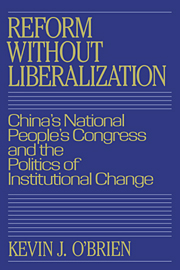 Reform without Liberalization
Reform without Liberalization 8 - The NPC and systemic change
Published online by Cambridge University Press: 22 March 2010
Summary
Legislative development from 1978 to 1989 paralleled development of the political system; changes were fitful and uneven, unexpected and incomplete. For each lively NPC session, there was a lifeless one, and for each significant reform, there was a rejected proposal or failed experiment. Political and legal institutionalization failed to take hold, and legislative strengthening continued to hinge on party initiative and forbearance. At times of crisis, the leadership was willing to use violence and psychological pressure to gain obedience and to abandon efforts to win popular consent. Reminiscent of the late 1950s, the party center, by the end of the 1980s, opposed all signs of political pluralism and silenced intellectuals and advisers who promoted procedural succession and parliamentarianism. In a matter of days, the full propaganda apparatus of the state was turned against purported advocates of “total westernization,” deputies were removed, and forums to discuss democratic reform were crushed.
One might conclude that the NPC and the Chinese political system closely resembled their predecessors under Mao. This would be mistaken. A review of legislative activities in the 1980s shows that the NPC came to occupy a new position in China and the political system, though still illiberal, was not unchanged by reform.
The last two chapters reviewed NPC plenary sessions and structural reforms and highlighted the process of change – its advocates and opponents, its chronology, and its scope. This chapter concludes the analysis by focusing on the results of change – what the NPC did from 1978 to 1989 and where it and the Chinese political system may be heading.
- Type
- Chapter
- Information
- Reform without LiberalizationChina's National People's Congress and the Politics of Institutional Change, pp. 157 - 179Publisher: Cambridge University PressPrint publication year: 1990


